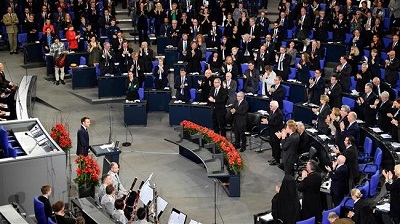In Berlin, President Emmanuel Macron of France renews the call for Europe to do more for its own defense and security, saying the continent cannot “become of plaything of great powers,” days after he irked the US by urging the formation of an independent European army.
In an address on Sunday to the German parliament (Bundestag) in the capital, Berlin, Macron asked Chancellor Angela Merkel to support a range of reforms to strengthen the European Union (EU), saying it was up to France and Germany to help build a more sovereign and efficient Europe fit for the future.
The continent, he said, must not “become a plaything of great powers, must assume greater responsibility for its security and its defense, and must not accept a subordinate role in world politics.”
“Europe and, within it, the Franco-German couple have the obligation not to let the world slip into chaos and to guide it on the road to peace,” Macron told the lawmakers. “That’s why Europe must be stronger… and win more sovereignty.”
Macron – who became the first French president to address Bundestag in 18 years – highlighted the challenges facing Europe ranging from climate change to migration, speaking of a “Franco-German responsibility” in setting the stage for the “re-founding of Europe.”
He also urged pro-EU forces in the continent to take concrete policy steps in a bid to fend off anti-immigrant, nationalist parties on the rise in several member states.
Macron – who was in Berlin to take part in Germany’s national Remembrance Day for the victims of war and dictatorship – also held talks with German Chancellor Angela Merkel on a range of issues, including migration, fixing the euro, Europe’s defense and taxing digital companies.
The two leaders also joined a press conference, during which Merkel agreed with Macron’s assessment that Europe stands “at a crossroads.”
“As those who were born after the [world] war, we are responsible for what we have truly learned,” she said. “As [Macron] said, we are finding our way on many new tasks, and we also want to do this together.”
Merkel also spoke of “how important the German-Franco friendship and co-operation is, and what role it plays in the European context.”
In an idea warmly supported by Merkel, Macron said last week that Europe needed a real army to reduce reliance on the United States for defense, drawing a fusillade of angry tweets by US President Donald Trump.
Trump described Macron’s idea as “very insulting,” saying, “Perhaps Europe should first pay its fair share of NATO, which the US subsidizes greatly.”
Trump has long been complaining that his country carries too much of NATO’s defense funding, calling on other members to double the amount of their gross domestic product (GDP) that they contribute to the military alliance.
German Defense Minister Ursula von der Leyen insisted Sunday that a joint military force would need not just common equipment and training but also “the political will to resolutely defend European interests when a conflict breaks out.”
France’s Minister for European Affairs Nathalie Loiseau has also told the Journal du Dimanche that “it is not a question of being against the United States but of taking our destiny into our own hands to no longer count on others.”
The prospect of a European army independent of the United States had already been raised by EU President Donald Tusk in May, after Trump engaged in a series of trade disputes with Europe, withdrew from the multilateral Iran nuclear deal and the Paris climate accord.
Trump also sparked worrie s globally last month when he announced he would be pulling the US out of the Intermediate-Range Nuclear Forces Treaty (INF) – which had been signed towards the end of Cold War in 1987 — between the US and the then Soviet Union.
s globally last month when he announced he would be pulling the US out of the Intermediate-Range Nuclear Forces Treaty (INF) – which had been signed towards the end of Cold War in 1987 — between the US and the then Soviet Union.
The controversial decision raised fears in Europe of a new arms race, which could put the security of the entire continent in danger.
Meanwhile, Germany and France have apparently struck a deal on a common budget for the EU countries that use the shared euro currency, something Macron pushed for.
German Finance Minister Olaf Scholz told the dpa news agency the proposal was to be presented to European finance ministers Monday.
PRESS T.V
R.S

